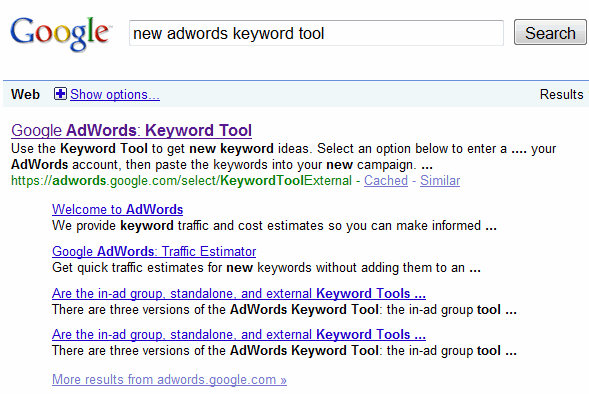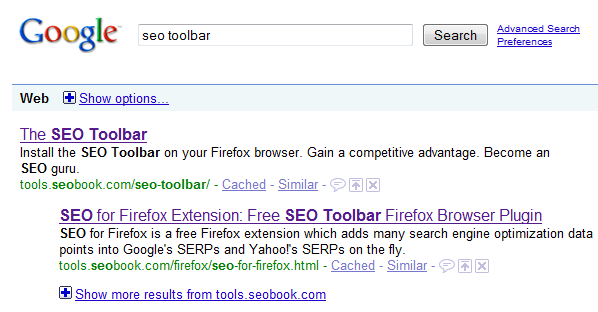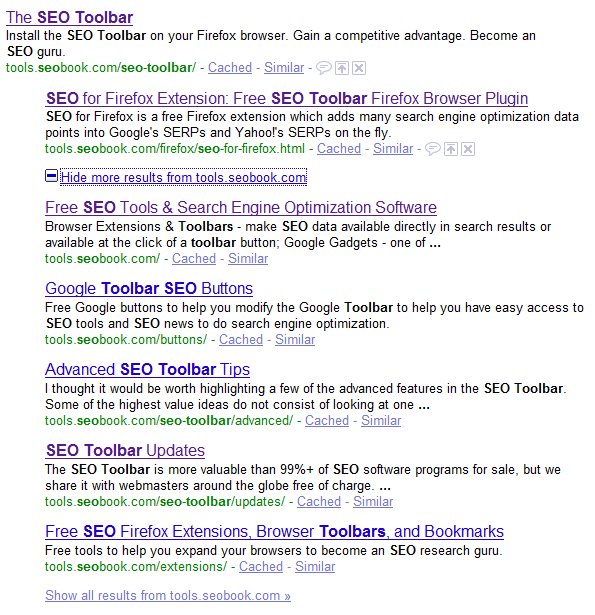Search Keeps Innovating
Steve Balmer on Search Innovation
In the above interview Steve Balmer states that search innovation has slowed down over the past 5 years compared to the 5 years prior. While committing to pouring billions of Dollars into the search market, Steve Balmer does not think that search has kept up its rate of innovation. But this perception is actually a fib. A lie. One that Steve must tell himself AND the media in order to try to gain press coverage for Bing and justify what will amount to a very expensive competition in the search marketplace. And it is a lie the media mush push to be able to write about / hype THE NEXT GOOGLE!!!!!!
Search Innovation is Speeding Up
The reason I know that search keeps speeding up is that I write about it. We offer subscribers a monthly newsletter, have forums that we participate in daily, and blog about the latest developments in search. This past month I have done a week of traveling and 2 conferences, but I have absolutely struggled to keep up with the all the changes recently (in spite of closing our site off to new members). Frankly I am amazed at how Danny Sullivan is able to put conferences together and still keep up with everything!
To understand the search game you must first understand that Google is first and foremost a public relations driven company which sells itself as a technology company. This is precisely why they market their browser/operating system as a browser and not an operating system...to avoid the regulations on (and comparisons with) Microsoft.
Recently Googlers have felt threatened by the media, Bing, Twitter, Facebook, and Wolfram Alpha. You can see this by looking at how Matt Cutts posted a 30 day challenge not to use any Microsoft projects, by all the daily innovations and releases Google is offering, by their promotion of a vaporware micropayment system, and by reading the recent 5 part interview of Eric Schmidt, Udi Manber, Amit Singhal, Scott Huffman, and Matt Cutts they did with BusinessWeek to remind the world how innovative Google is.
Google has went as far as advertising their advanced search tips on many search queries and even SELLING SEARCH AS A LIFESTYLE!?!?!
Now some of the changes may not be noticeable to the average searcher because Google has become more refined over the years. But it does not mean that the market lacks innovation. I thought it would make sense to put a post together to highlight some of the ways search has changed so far this year.
Under the Hood Innovation
Google stated they plan to support their rel=canonical tag across domain names and let you set URL parameters for them to ignore.
A few months back Google announced their new caffeine index, but some of the algorithmic changes are far more subtle. When Patrick Altoft tried to dissect some of the ideas behind the Vince/brand update he quoted this killer post from the always impressive Tedster
Here's my current idea. I believe that Google's staff contains more statisticians than any other specialty. The algo is, more and more, driven by statistics and probability. These statisticians watch query data as well as backlink data. That's what jumped out at me while re-reading this patent: backlinks PLUS queries.
....
This is my current brainstorming area, and it's why I recommend the idea of ATTRACTING backlinks more than "building" them. Backlinks alone cannot create a statistically correct footprint for a growing, thriving website. Even though such a "dummied-up" impression has been a working tool for improved ranking in the past, it's a tool whose future is getting more and more cloudy.
Creating a legitimate looking link profile by doing nothing but push marketing keeps getting harder as Google refines what they are looking for as a natural link building profile based on better statistics. If your link building efforts revolve around public relations, publicity, and brand then you are good to go. But if they are mechanical and aggressive you can use fairly similar link building strategies on 2 parallel sites and see one rank while the next is stuck somewhere in Google hell. From the above linked 5 Googler interviews you can see how Google is constantly working to improve localization, word relationships, indexing, and spam detection. QDF + universal search further complicate the search results.
Filtering Information
Beyond the core ranking algorithms there are also new ways to sort through information.
Google has added many options / filters / lenses to view search through, including links to...
- vertical databases (like Videos, News, Blogs, Books, Forums, and Reviews)
- results within specific time frames
- ways to navigate related searches (via Related searches, Wonder wheel, Timeline)
- additional filters (like displaying images from the page, more text, fewer or greater shopping sites)
Thinking through those type of filters with universal search in mind (and Google's new caffeine index in place) you could see how Google can further alter the search landscape on a query by query basis. Give me something fresh, give me old trusted stuff, give me at least 1 authoritative review, etc. In select markets this can be further refined by editorial partnerships like the health onebox.
Here are recent SEO results. And when authoritative SEO related sites (like SEO Book, Search Engine Land, SEOMoz, SE Roundtable, Search Engine Journal, Search Engine Watch, etc.) publish fresh posts they quickly get mixed into the top 10 to 20 search results (similarly to how Google News results get mixed in). As Google tests mixing in different types of results they can track user response on a per query basis, and bucket different related keywords together.
Inspired User Interface Innovation
A lot of the innovations come from competing search services. Consider that
- Google's SearchWiki (and SideWiki) were heavily inspired by Wikia Search.
- Yahoo! implemented search suggestion features widely before Google did.
- Ask 3D pushed about a lot of the universal search sort of ideas.
- Google tried to clone Youtube, right up until they were forced to buy it.
- Bing launched a new visual search service.
- Wolfram Alpha forced Google to create and evolve the Google Squared service.
- Yahoo! SearchMonkey pushed microformats, which are now becoming more popular across competing search services.
- One of Microsoft's best Bing innovations was putting the ads closer to the organic search results - which was quickly copied by Google.
Single Listing? Double Listing? Triple Listing? Quadruple Listing?
In the past sometimes sites would be able to get a double listing and/or sitelinks. Recently I saw a quadruple listing

Google is better surfacing forum posts in search results, has tested displaying breadcrumb navigation in the search results, and is returning internal link anchor page-links directly in the search results.
Google has made results from site: searches extensible


Search Business Model Innovation
Paid search is so easy to grasp that Google's test case is LITERALLY a pet stick!

In spite of the ease of marketing Google is not happy leaving that as is.
Google is testing using machine learning algorithms (and current Google AdWords advertiser data!!!!!!!!!) to set flat rate search ad pricing for small local businesses. And they are rumored to be launching a LendingTree clone.
Google ***is*** the competition, and they keep taking more of the web for themselves.
They are also ramping up their ad exchange. Traditionally Google has tried to credit the last click with most of the value since they are the #1 search company. But brand advertisers buy branded display ads based on mushy feely impulses...and so search can't keep taking all the credit forever if Google wants to expand the online ad pie to become a $100 billion company. As display ad clickers fall off a cliff, Google is beginning to show view conversions (conversions where an ad was viewed but not click) to further justify fuzzy brand spend. Hey if they have ads on 80% of the WWW then you are going to think those ad views created some conversions, even if they were ignored.
It doesn't matter what regulations appear, advertisers feel the need to buy those ads because that is where the distribution is. Currently Google (and Facebook) have such domination over advertisers that they can mass ban them and shut them down overnight as desired, in spite of the economic climate.
There is going to be continued innovation in the online advertising space as marketers better test / recommend / track / explore / learn how to better automate blending ads and content.
Google is testing ads tied to location pages and product ads directly in the search results.
Further marketers are studying how ads sometimes sell something other than what they were created to sell, and there is research being done on ad fatigue and relevancy.
Media Innovation
Google has been buying maps marketshare through cross promotion, a fairly flexible API, collecting user data, and clever promotional tie ins with the likes of Monopoly. China might crack down on Baidu's music piracy, and Google has distribution deals to buy marketshare as long as China allows it to happen. Increasingly Google is procuring the source of record for a greater and greater number of classifications of information types. They are already pushing their power meter, have Sony distributing their browser, and patenting some types mobile consumer reviews. Alas everything is information!
Google is learning to read more content in new formats like AJAX and is getting better at spitting content back out via a quick view of PDFs and mobile printing devices.
Google has begun trying to tie search volumes to economic activity, with their economist claiming that the economy is improving. Others, like Kayak, have followed suit by sharing their data in an easy to reference format.
All this additional content creates more competition and lowers profit margins for web publishers. And affiliate marketing will continue to grow harder. Increasingly successful media is going to need to bake self-promotion in its core, and profitable media will become more of an interactive service.
Why Write a 5 Page Blog Post With ~80 Links in It?
3 reasons...
- to help me collect my thoughts and share them with you, our readers! :D
- to point out that anyone talking about a lack of innovation is search is speaking from ignorance, hyping public relations messaging to the media, and/or lying
- to help push to save Yahoo! Boss. By some measures it might be bigger than Bing AND it if it stays around it will help ensure that search keeps innovating at faster and faster rates with healthy market competition




Comments
Aaron.
I think that is actually the most valuable post that I have read of yours.
Thanks for the breaking news and discounts of course ;-)
Matt
Do you believe that google becoming better at telling a natural link profile from an unnatural link profile will involve discounting links that only send traffic once, but never again (or call it "attention whoring" link bait)?
Ive been thinking for a while that anyone taking a strategic approach to SEO should go for mostly the types of links that continue to send click traffic, as the links that only send traffic once might lose value for SE rankings in the near future (the same way reciprocal links have).
Possibly. BUT most likely no, especially if repeated routinely.
Algorithmically what is the difference between attention whoring for links routinely and a news outlet that keeps breaking interesting news stories a couple times each week?
Would Google want to penalize Gawker-type websites? Not likely, IMHO. And if you can attention whore over and over again successfully then it eventually creates something more than the sum of the pieces.
Interesting - I totally forgot to consider news sections..they probably do make it difficult to just assume that links that dont continue to send traffic are attention whoring type of links.
Something to think about, very good read Aaron. As with most things, time will tell, if it already hasn't begun to. Once again very good read.
It really is kind of amusing, actually. This is a perfect time to blog about just how crazy the Google advances have been over the past 4-6 months, and Microsoft publishes the opposite. I guess they feel they need to push that perspective. I guess they have nothing in the oven after all? Need to make every little innovation appear to be significant? Ignore how everything we see Google releasing now, was in the works during the past 3 years? How they probably have a lot more not yet released?
Perhaps the saddest part of this will be when Google latches onto this Microsoft hype, and supports it. They need to, so no one highlights just how much of a monopoly Google has, or how untouchable Google is in search.
I think we've only seen the tip of the iceburg when it comes to Google's penetration into the local commerce behind local search.
Great comment as usual John!
Google is certainly talking out of both sides of their mouth on search. In spite of leverage monopoly pricing power (where Google sets arbitrary pricing floors), just today they were claiming that scale does not matter in search, and yet they still are looking for ways to slow down the Yahoo! search distribution deal with Bing.
Best post in a long time. I don't know how you find time to crank out these gems. Thank you Aaron
Patrick about natural / unnatural profiles, I wonder what a natural link profile should look like for an e-commerce site that isn't "controversial" or blogging like crazy / viral marketing like crazy to win links (i.e. 99% of e-commerce sites), yet may stock some excellent items at good value?
Think of the site that is a small business, specialists in some service or making a product. Offline, a company can rely on reputation. Online, it's invisible if it's not ranking.
Such a site, I argue, would not win many links from bloggers and commenters who are far more likely to latch onto controversy and news-worthy items. In fact, I find bloggers just steer clear of linking to e-commerce sites because such a link would smell of "paid post" even if it wasn't. And what of other business sites? They only link out if it's quid-pro-quo in some way (a link back, or paid). So where does such a site win a natural link?
I think Google understands this dilemma (just don't listen to Matt Cutts!), and forgives unnatural link profiles so long as you throw in a few authority links (e.g. Yahoo! directory listing). It's the game in town, and everyone's playing it, and Google certainly knows it. After all, even Bing are giving SEO tips in terms of link building, so I guess Google forgives - and even rewards - unnatural links because a site without links doesn't tell Google as much as a site with links.
I think the rareness with which such ecommerce sites gets links does make them more likely to get them in waves or spikes when they actually do get them. If they have a screwed up price, a great coupon, or a unique and remarkable item (or maybe if they provide great customer service) and it is noticed by a well known blogger then there would likely be a water flows downhill effect where other bloggers also might link to them based on seeing the initial exposure.
@AndrewL those unremarkable ecommerce sites without pizazz (or controvery) are clearly addressed by Google through Google Base (and now Google Merchant Center). The services aspects are addressed through Google Local and the Google Business Center. In fact, Google has it all covered... working to eliminate the need for unique interfaces to non-unique "data".
I doubt you want to accept Google's view of your commodity status, though, which is the fundamental reason we need to make your site "remarkable".
Sad truth is, it's just further proof that Microsoft doesn't see relevance as a necessary thing in the search business.
Just wrote about that on my blog competitiondemolition.com
Truly sad , be nice to have TWO search innovators out there. Or perhaps they're downplaying Google's success & findings?
Add new comment